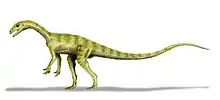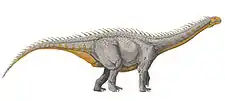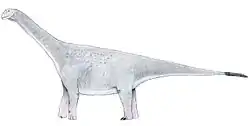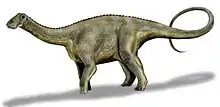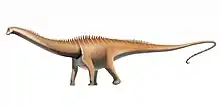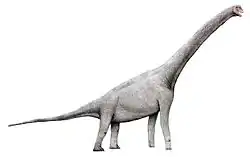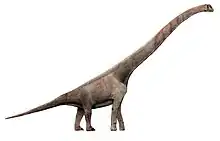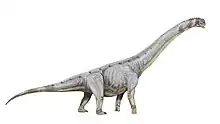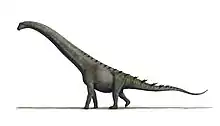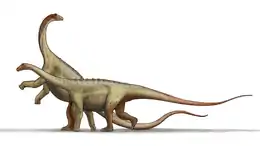Gyposaurus
Gyposaurus (meaning "vulture lizard", referring to the outdated hypothesis that prosauropods were carnivores) is a genus of basal sauropodomorph dinosaur from the early Jurassic of South Africa. It is usually considered to represent juveniles of other prosauropods, but "G." sinensis is regarded as a possibly valid species.[1]
| Gyposaurus | |
|---|---|
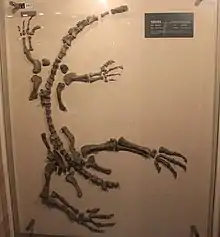 | |
| "G". sinensis fossil on display at the Geological Museum of China | |
| Scientific classification | |
| Kingdom: | Animalia |
| Phylum: | Chordata |
| Clade: | Dinosauria |
| Clade: | Saurischia |
| Suborder: | †Sauropodomorpha |
| Clade: | †Plateosauria |
| Genus: | †Gyposaurus Broom, 1911 |
| Type species | |
| †Gyposaurus capensis Broom, 1911 | |
| Other species | |
| |
| Synonyms | |
| |
Taxonomy

G. capensis was named in 1911 by Scottish physician and paleontologist Robert Broom from a partial skeleton consisting of eleven dorsal and six caudal vertebrae, ribs, gastralia, partial right scapula, right pelvic girdle, left ilium, and most of the right leg, discovered in the Upper Elliot Formation of Orange Free State, South Africa.[2] Originally, he thought the specimen belonged to the dubious genus Hortalotarsus.[2] Galton and Cluver placed it in the genus Anchisaurus in 1976,[3] but Michael Cooper synonymized it with Massospondylus in 1981,[4] which has been generally accepted.

"G." sinensis was named by Yang Zhongjian (C.C. Young) in 1941 for four specimens including jaw fragments and postcranial material from the Early Jurassic Lufeng Formation of Yunnan Province, China.[5] In 1976, Galton referred it to Lufengosaurus,[6] while Dong Zhiming referred it to Anchisaurus in 1992.[7] Galton and Upchurch (2004) considered it to be a valid, distinct taxon in need of a new generic name.[1] Barrett et al. (2007) proposed the name "Gripposaurus" for this species, but it is a nomen nudum.[8] Unpublished results of a presentation by Wang and colleagues at the SVP 2017 conference indicate that "G." sinensis is a junior synonym of Lufengosaurus huenei; however, some referred specimens need further study to determine their relationships.[9]
References
- Galton, P.M.; Upchurch, P. (2004). "Prosauropoda". In Weishampel, D.B.; Dodson, P.; Osmólska, H. (eds.). The Dinosauria (2nd ed.). Berkeley, CA: University of California Press. pp. 232–258. ISBN 0-520-24209-2.
- Broom, R. (1911). "On the dinosaurs of the Stormberg, South Africa". Annals of the South African Museum. 7 (4): 291–308.
- Galton, P.M.; Cluver, M.A. (1976). "Anchisaurus capensis (Broom) and a revision of the Anchisauridae (Reptilia, Saurischia)". Annals of the South African Museum. 69 (6): 121–159.
- Cooper, M.R. (1981). "The prosauropod dinosaur Massospondylus carinatus Owen from Zimbabwe: its biology, mode of life and phylogenetic significance". Occasional Papers of the National Museums and Monuments of Rhodesia, Series B, Natural Sciences. 6 (10): 689–840.
- Young, C.C. (1941). "Gyposaurus sinensis Young (sp. nov.) a new Prosauropoda from the Upper Triassic beds at Lufeng, Yunnan". Bulletin of the Geological Society of China. 21 (2–4): 205–252. doi:10.1111/j.1755-6724.1941.mp212-4005.x.
- Galton, P.M. (1976). "Prosauropod dinosaurs (Reptilia: Saurischia) of North America". Postilla. 169: 1–98.
- Dong, Z. (1992). Dinosaurian Faunas of China. Beijing: China Ocean Press. ISBN 0-387-52084-8.
- Barrett, P.M.; Upchurch, P.; Zhou, X.D.; Wang, X.L. (2007). "The skull of Yunnanosaurus huangi Young, 1942 (Dinosauria: Prosauropoda) from the Lower Lufeng Formation (Lower Jurassic) of Yunnan, China". Zoological Journal of the Linnean Society. 150 (2): 319–341. doi:10.1111/j.1096-3642.2007.00290.x.
- Wang, Y.M.; You, H.L.; Otero, A.; Wang, T. (August 23–26, 2017). "Taxonomy of "Gyposaurus" sinesis Young, 1941 from the Early Jurassic Lufeng Formation of Yunnan Province, southwestern China". SVP 2017 Meeting Program and Abstracts. Society of Vertebrate Paleontology 77th Annual Meeting. Calgary: Society of Vertebrate Paleontology. p. 210.
